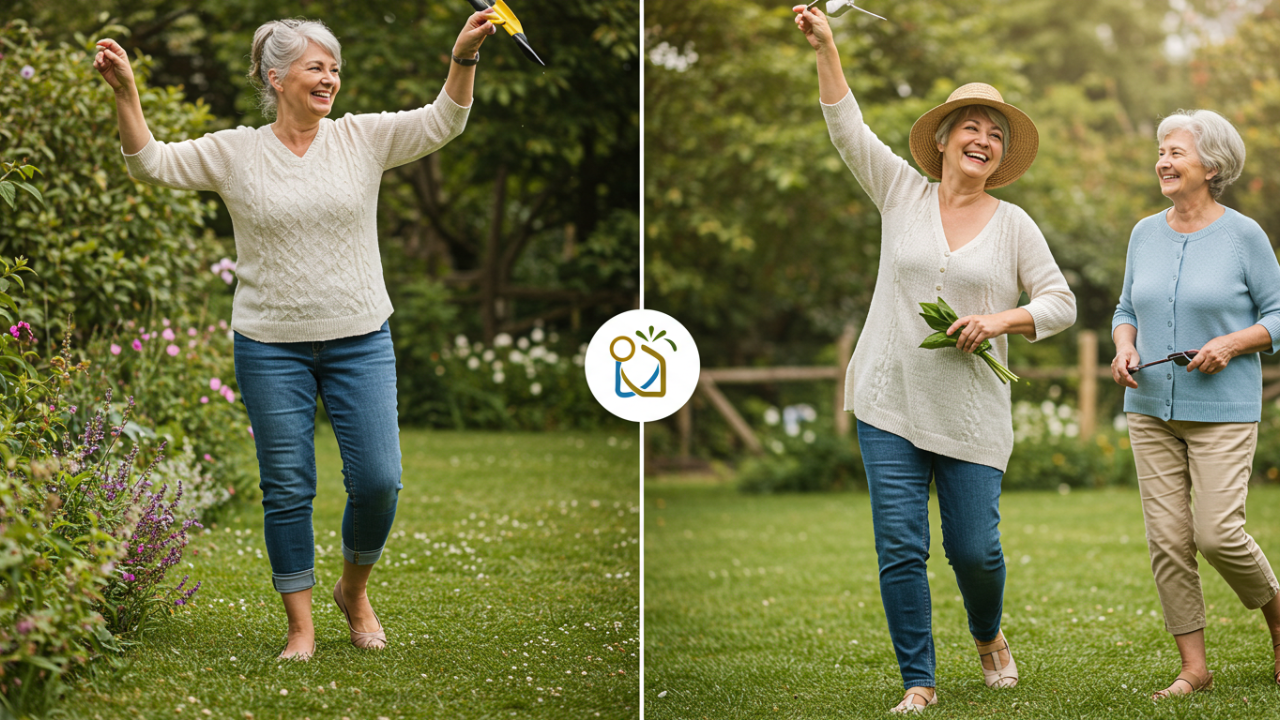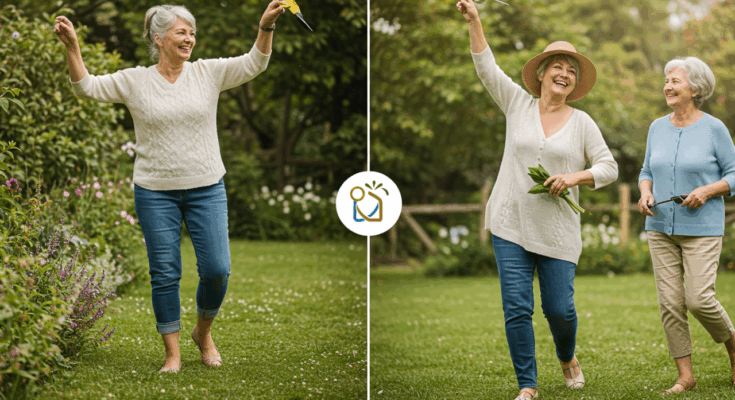Aging is an inevitable part of life, a journey we all embark on. But what if we could shift our perspective from dreading the passing years to embracing them with optimism, vitality, and a profound sense of joy? “Age Gracefully, Live Joyfully” isn’t just a catchy phrase; it’s a philosophy, a proactive approach to not just extending our years, but enriching every single one of them. It’s about understanding that while time marches on, our capacity for growth, happiness, and well-being doesn’t have to diminish.
This article delves into the multi-faceted aspects of aging gracefully, providing actionable insights and practical strategies to cultivate physical health, mental resilience, emotional balance, and social connection throughout your life. We’ll explore how small, consistent choices can lead to significant impacts, empowering you to navigate the journey of aging not as a decline, but as a continuous ascent towards a richer, more fulfilling existence.
Redefining Aging: Beyond the Stereotypes
For too long, societal narratives have painted aging with a brush of decline – frailty, forgetfulness, and a retreat from active life. It’s time to challenge these outdated notions. Modern science and a growing understanding of human potential reveal a different truth: aging can be a period of immense growth, wisdom, and continued contribution.
-
Challenging the “Downward Slope” Mentality: Instead of viewing aging as a downhill slide, let’s see it as a climb towards new perspectives, deeper understanding, and refined strengths. Many individuals find their most creative and impactful years later in life.
-
Embracing the Wisdom of Experience: Every year lived accumulates invaluable experience, lessons learned, and a unique perspective that younger generations can benefit from. This wisdom is a powerful asset, not a burden.
-
Focusing on “Healthspan” not just “Lifespan”: The goal isn’t just to live longer, but to live well for as long as possible. Healthspan refers to the period of life spent in good health, free from chronic disease and disability. This is where our focus should truly lie.

The Pillars of Graceful Aging
Achieving a joyful and graceful aging experience rests on several interconnected pillars. Neglecting one can impact the others, highlighting the importance of a holistic approach.
H2: Physical Vitality: Your Body as a Temple
Our physical body is the vessel through which we experience life. Nurturing it is fundamental to graceful aging.
Regular physical activity is arguably the single most impactful habit for healthy aging. It’s not about becoming an Olympic athlete, but about consistent, purposeful movement.
-
Cardiovascular Health: Activities like brisk walking, swimming, cycling, or dancing strengthen your heart and lungs, improve circulation, and help maintain a healthy weight. Aim for at least 150 minutes of moderate-intensity cardio per week.
-
Strength Training: As we age, we naturally lose muscle mass (sarcopenia). Strength training, using weights, resistance bands, or even your own body weight, helps preserve muscle, bone density, and metabolism. Strong muscles also improve balance and reduce fall risk.
-
Flexibility and Balance: Yoga, Pilates, tai chi, and simple stretching routines enhance flexibility, improve range of motion, and significantly boost balance, a critical factor in preventing falls. Even 10-15 minutes daily can make a difference.
-
Listen to Your Body: Adapt your exercise routine as needed. Consult with a doctor or physical therapist to tailor a safe and effective plan, especially if you have pre-existing conditions.
What you put into your body directly impacts your energy levels, disease risk, and cognitive function.
-
Whole, Unprocessed Foods: Prioritize fruits, vegetables, whole grains, lean proteins, and healthy fats. These provide essential vitamins, minerals, antioxidants, and fiber.
-
Hydration is Key: Water is crucial for every bodily function. Dehydration can lead to fatigue, confusion, and other health issues. Carry a water bottle and sip throughout the day.
-
Mindful Eating: Pay attention to hunger and fullness cues. Avoid eating distractedly. Savor your meals.
-
Limit Processed Sugars and Saturated Fats: These contribute to inflammation, weight gain, and increased risk of chronic diseases.
-
Consider Supplements Wisely: While a balanced diet is paramount, certain supplements like Vitamin D, B12 (especially for vegetarians/vegans), or Omega-3s might be beneficial. Always discuss with your doctor before starting any new supplement regimen.
Quality sleep is non-negotiable for overall health, affecting everything from cognitive function to immune response.
-
Aim for 7-9 Hours: Most adults need this amount of sleep per night.
-
Establish a Routine: Go to bed and wake up around the same time each day, even on weekends.
-
Create a Conducive Environment: Keep your bedroom dark, quiet, and cool.
-
Limit Screen Time Before Bed: The blue light emitted from devices can disrupt melatonin production.
-
Avoid Caffeine and Heavy Meals Late: These can interfere with sleep onset and quality.
H2: Mental Acuity: Keeping Your Mind Sharp
A sharp mind is a joyful mind. Just like your body, your brain thrives on activity and stimulation.
Learning new things forms new neural pathways, enhancing cognitive flexibility and resilience.
-
Read Regularly: Engage with diverse topics, fiction and non-fiction.
-
Learn a New Skill: Pick up a musical instrument, learn a new language, try painting, or delve into a new hobby.
-
Engage in Puzzles and Brain Games: Crosswords, Sudoku, chess, and even video games can challenge your mind.
-
Take a Course: Many universities offer free online courses, or local community centers provide adult education.
Chronic stress is detrimental to both physical and mental health, accelerating aging.
-
Practice Mindfulness and Meditation: Even short daily sessions can reduce stress, improve focus, and enhance emotional regulation.
-
Spend Time in Nature: “Forest bathing” or simply being outdoors has proven benefits for stress reduction and mental well-being.
-
Deep Breathing Exercises: Simple breathing techniques can calm the nervous system instantly.
-
Prioritize Relaxation: Schedule time for activities you enjoy that help you unwind.
H2: Emotional Well-being: Cultivating Inner Peace
Our emotional landscape profoundly impacts our experience of aging. Cultivating positivity and resilience is crucial.
Humans are social creatures. Strong, supportive social connections are protective against loneliness, depression, and even cognitive decline.
-
Stay Connected: Make an effort to regularly connect with family and friends.
-
Join Groups: Hobbies, volunteer work, or community organizations offer opportunities to meet new people and build connections.
-
Be Present: When interacting with others, put away distractions and give them your full attention.
-
Practice Empathy and Forgiveness: Both for yourself and others, letting go of grudges can be incredibly liberating.
Having a reason to get up in the morning, a feeling of contribution, is a powerful antidote to feeling lost or irrelevant as we age.
-
Volunteer: Give back to your community in areas you’re passionate about.
-
Mentor Others: Share your expertise and wisdom with younger generations.
-
Pursue Passions: Dedicate time to hobbies or projects that bring you deep satisfaction.
-
Continuous Contribution: Find ways to remain engaged and feel valuable, whether through work, family, or community involvement.
A positive outlook doesn’t mean ignoring challenges, but choosing to focus on the good and believing in your ability to navigate difficulties.
-
Gratitude Journal: Regularly write down things you are grateful for.
-
Practice Positive Affirmations: Challenge negative self-talk with constructive, uplifting thoughts.
-
Savor Small Joys: Take time to appreciate the simple pleasures in life – a beautiful sunset, a warm cup of coffee, a good book.
Proactive Health Management: Being Your Own Advocate
While lifestyle choices are paramount, regular medical check-ups and proactive health management become increasingly important with age.
-
Regular Check-ups: Don’t skip your annual physicals. Early detection of potential issues is key.
-
Preventative Screenings: Follow recommended guidelines for screenings like mammograms, colonoscopies, bone density scans, and blood pressure checks.
-
Medication Management: Understand all your medications, their purpose, and potential side effects. Keep an updated list.
-
Dental and Eye Care: Oral health impacts overall health, and vision changes are common. Regular check-ups are essential.
-
Vaccinations: Stay up-to-date on recommended vaccinations like flu shots, pneumonia, and shingles.
-
Advocate for Yourself: Don’t hesitate to ask questions, seek second opinions, or research conditions. You are an active participant in your health journey.
The Role of Aesthetics: Feeling Good, Looking Good (on Your Own Terms)
While inner wellness is the cornerstone, feeling good about your appearance can also contribute to overall joy and confidence. This doesn’t mean chasing youth, but embracing self-care.
-
Skincare: Protect your skin from sun damage, moisturize regularly, and use gentle products.
-
Hair Care: Experiment with styles that make you feel good.
-
Fashion: Dress in ways that make you feel comfortable, confident, and reflective of your personality, regardless of age-related “rules.”
-
Dental Aesthetics: A healthy, confident smile can significantly boost self-esteem.
Remember, the goal isn’t to look 20 again, but to look and feel your best at your current age. It’s about personal comfort and confidence, not external validation.
Embracing Change and Adaptation
Aging involves change, and a key aspect of graceful aging is the ability to adapt.
-
Acceptance: Acknowledge that certain things will change, both physically and circumsturally. Resistance to change can breed frustration.
-
Flexibility: Be open to adjusting your routines, activities, and expectations as needed.
-
Seek Support: Don’t be afraid to ask for help when you need it, whether from family, friends, or professional services.
-
Maintain Independence (Where Possible): Adapt your home environment, use assistive devices, or explore services that allow you to maintain independence for as long as possible.
Conclusion: Your Joyful Journey Awaits
Aging gracefully and living joyfully is not a destination, but a continuous journey of self-discovery, adaptation, and intentional living. It’s about recognizing that every stage of life holds unique gifts and opportunities. By consistently nurturing your physical, mental, and emotional well-being, fostering strong connections, maintaining a sense of purpose, and embracing an optimistic outlook, you can not only add years to your life but, more importantly, add life to your years.
Embrace the wisdom that comes with experience, celebrate your journey, and empower yourself to live each day with vitality, curiosity, and boundless joy. The path to graceful aging is yours to define, and it promises to be one of the most rewarding adventures of your life.
FAQ: Age Gracefully, Live Joyfully
Is it ever too late to start adopting healthy habits for graceful aging?
A1: Absolutely not! It’s never too late to start. While consistent healthy habits throughout life offer the most benefits, positive changes at any age can significantly improve your healthspan and quality of life. Even small steps, like starting a walking routine, improving your diet, or engaging in mental exercises, can yield noticeable results within weeks or months.
What’s the single most important thing I can do to age gracefully?
A2: While many factors contribute, a strong argument can be made for regular physical activity, especially a combination of cardio, strength, and flexibility training. It impacts not only physical health (heart, bones, muscles) but also cognitive function, mood, and sleep quality. However, a truly holistic approach that includes nutrition, mental stimulation, and social connection will provide the most comprehensive benefits.
How can I combat loneliness as I get older?
A3: Loneliness is a significant concern for many older adults. Actively seek out opportunities for social engagement. This could include:
* Joining clubs or groups: Based on hobbies (book clubs, hiking groups, art classes).
* Volunteering: Giving back to the community is a great way to meet like-minded people.
* Community Centers: Many offer activities and classes specifically for seniors.
* Staying connected with family and friends: Make regular phone calls, video chats, or plan in-person visits.
* Adopting a pet: Pets can provide companionship and a sense of purpose.
I’m worried about memory loss. What can I do to keep my brain sharp?
A4: Engaging in lifelong learning is crucial. This includes:
* Reading diverse materials.
* Learning new skills or languages.
* Playing brain-stimulating games (puzzles, chess, Sudoku).
* Staying physically active (exercise boosts blood flow to the brain).
* Eating a brain-healthy diet (rich in Omega-3s, antioxidants, whole foods).
* Getting adequate sleep.
* Managing stress through mindfulness or relaxation techniques.
Should I stop working completely when I reach retirement age to “rest”?
A5: Not necessarily. While some people benefit from full retirement, many find continued engagement through work (full-time, part-time, or consultancy), volunteering, or pursuing passions to be incredibly fulfilling. A sense of purpose and continued intellectual and social stimulation can be vital for mental and emotional well-being. The key is to find a balance that feels right for you and supports your overall health and happiness.
What role does attitude play in aging gracefully?
A6: A huge role! A positive outlook, a sense of gratitude, and resilience in the face of challenges are incredibly powerful. Research consistently shows that optimists tend to live longer, healthier lives. Cultivating a positive mindset, challenging negative self-talk, and focusing on what you can do rather than what you can’t can significantly impact your experience of aging. Your mindset truly shapes your reality.



